

Teacherless activities ccsf esl colloquium 2015. Word Generator from letters hotchocolate. Google Image Result for. Do You Like Food. Learning Prepositions with Pete the Cat. Motor Skills Preposition Game. My daughter has always been a climber.
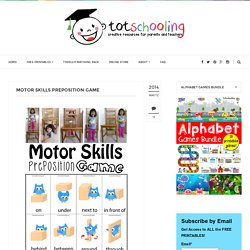
By the time she was a year old she had conquered couches, chairs, small tables, and anything low to the ground. Now, as a toddler, she gets strategic and figures out how to reach the cookies in the top cabinet, or the light switch that controls the fan in the living room. Where are you? Prepositions of place. Prepositions of place. Examples My dad is in the kitchen.
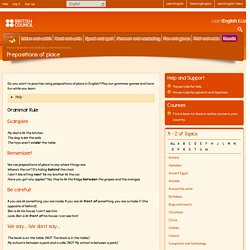
The dog is on the sofa. The toys aren’t under the table. Remember! ESL Worksheets - Primary Picture Dictation. Nancy Nolan's Kindergarten. Speak and spell. Why does my toddler love repetition? Paediatric speech and language therapist.
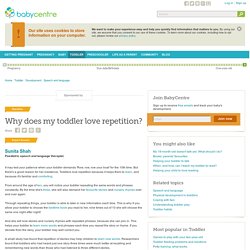
It may test your patience when your toddler demands 'Row, row, row your boat' for the 10th time. But there's a good reason for her insistence. Toddlers love repetition because it helps them to learn, and because it's familiar and comforting. From around the age of two, you will notice your toddler repeating the same words and phrases constantly. How can I help my child to start talking? (Video) Health visitor Sara Patience describes how you can help develop your child's language skills by talking and playing with her.
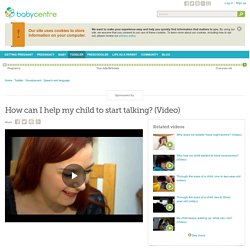
The Woman Who Changed Her Brain: Barbara Arrowsmith-Young at TEDxToronto. Early Childhood Care and Education. Early childhood, defined as the period from birth to eight years old, is a time of remarkable growth with brain development at its peak.

During this stage, children are highly influenced by the environment and the people that surround them. Early childhood care and education (ECCE) is more than preparation for primary school. It aims at the holistic development of a child’s social, emotional, cognitive and physical needs in order to build a solid and broad foundation for lifelong learning and wellbeing. ECCE has the possibility to nurture caring, capable and responsible future citizens. How Young Children Learn. Understanding how young children learn helps us adapt our teaching or parenting to meet their needs in more effective ways.
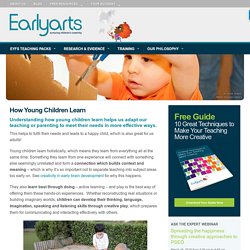
This helps to fulfil their needs and leads to a happy child, which is also great for us adults! Young children learn holistically, which means they learn from everything all at the same time. Something they learn from one experience will connect with something else seemingly unrelated and form a connection which builds context and meaning – which is why it’s so important not to separate teaching into subject areas too early on.
See creativity in early brain development for why this happens. They also learn best through doing – active learning – and play is the best way of offering them these hands-on experiences. Young children learn a huge amount through their senses which become finely tuned long before they may have mastered speaking or reasoning skills. Five essential tips for teaching very young children English. Are you daunted by the prospect of teaching English to very young children? Sheona Gilmour, lead educator on our new online course for teachers and parents, offers a few tips. Teaching English to very young children can be challenging, especially if you haven't done any training for the early years classroom.
The first time I walked into a kindergarten, I didn’t want to go back the next day. I came from a background of teaching older children, who sat at desks and whose attention I could hold more easily. So the new environment, full of young children with much shorter attention spans, felt overwhelming. Ideas, tips and resources for primary language teachers. How young children learn English as another language. By Opal Dunn, educational consultant and author Introduction Young children are natural language acquirers; they are self-motivated to pick up language without conscious learning, unlike adolescents and adults.
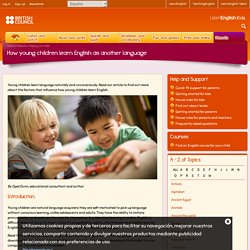
They have the ability to imitate pronunciation and work out the rules for themselves. Any idea that learning to talk in English is difficult does not occur to them unless it’s suggested by adults, who themselves probably learned English academically at a later age through grammar-based text books. Alison Gopnik: What do babies think? Patricia Kuhl: The linguistic genius of babies.
What Parents Can Gain From Learning the Science of Talking to Kids. The widening education gap between the rich and the poor is not news to those who work in education, many of whom have been struggling to close the gap beginning the day poor children enter kindergarten or preschool.
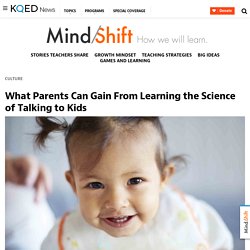
But one unlikely soldier has joined the fight: a pediatric surgeon who wants to get started way before kindergarten. She wants to start closing the gap the day babies are born. When Dr. Dana Suskind began doing cochlear implants on infants at the University of Chicago—a cutting-edge surgical technique that allows once-deaf babies to hear—in her follow-ups with families she noticed a stark difference in how the now-hearing children acquired language.
Once they could hear, some children’s language skills thrived and grew, while others languished. The difference turned out to be the words children heard from their parents and caregivers, millions of them. For Suskind, a lightbulb went on. Bringing Parents On Board Of course, some words are more powerful than others. . * Tune In.